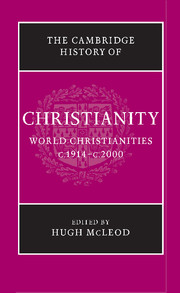Book contents
- Frontmatter
- 1 Introduction
- 2 Being a Christian in the early twentieth century
- PART I INSTITUTIONS AND MOVEMENTS
- 3 The papacy
- 4 Ecumenism
- 5 Christianity, colonialism and missions
- 6 The Pentecostal and Charismatic movements
- 7 Independency in Africa and Asia
- PART II NARRATIVES OF CHANGE
- PART III SOCIAL AND CULTURAL IMPACT
- Bibliography
- Index
- References
6 - The Pentecostal and Charismatic movements
from PART I - INSTITUTIONS AND MOVEMENTS
Published online by Cambridge University Press: 28 March 2008
- Frontmatter
- 1 Introduction
- 2 Being a Christian in the early twentieth century
- PART I INSTITUTIONS AND MOVEMENTS
- 3 The papacy
- 4 Ecumenism
- 5 Christianity, colonialism and missions
- 6 The Pentecostal and Charismatic movements
- 7 Independency in Africa and Asia
- PART II NARRATIVES OF CHANGE
- PART III SOCIAL AND CULTURAL IMPACT
- Bibliography
- Index
- References
Summary
Revivals preceding Pentecostalism
Although sporadic outbursts of ‘spiritual gifts’ and ecstasy have occurred throughout Christian history, the idea developed particularly in the Protestant missionary, healing and ‘Holiness’ movements in the late nineteenth century that there was an experience after conversion called ‘baptism in the Holy Spirit’, the key doctrine of classical Pentecostals. Wesley’s doctrine of a ‘second blessing’, a crisis experience subsequent to conversion, had a significant influence on the emergence of Pentecostalism. Increasingly the phrase ‘baptism with the Spirit’ was used to indicate the ‘second blessing’, but towards the end of the nineteenth century in the English Keswick Conventions and elsewhere it was no longer understood in terms of holiness, but as empowering for service. A new expectancy was created through various revivals and the ‘second blessing’ was linked with a worldwide revival, the ‘latter rain’ that would precede the return of Christ. At the same time, the experience of the Spirit was linked with a search for the ‘power’ of Pentecost, a new development that was to overtake the earlier emphasis on ‘perfection’. The divine healing movement, whose theology was taken over almost completely by early Pentecostalism, gave further impetus to these ideas.
The Welsh Revival (1904–5) emphasised the Pentecostal presence and power of the Spirit, as meetings were long, spontaneous, seemingly chaotic and emotional, focusing on the immediacy of God in the services and in personal experience. This revival was declared to be the end-time Pentecost of Acts 2, the ‘latter rain’ promised by biblical prophets that would result in a worldwide revival.
- Type
- Chapter
- Information
- The Cambridge History of Christianity , pp. 89 - 106Publisher: Cambridge University PressPrint publication year: 2006



